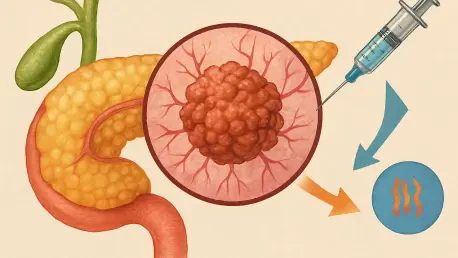
In a world where medical advancements are reshaping everyday procedures, consider the possibility of undergoing cataract surgery not in a daunting hospital setting, but in the familiar comfort of a doctor’s office, with just a simple pill to calm the nerves. This isn’t a far-fetched idea but a

Ulcerative colitis (UC), a chronic inflammatory bowel disease, affects millions of individuals worldwide, presenting as persistent inflammation in the colon and rectum, often resulting in severe discomfort and a diminished quality of life for those affected. For patients dealing with moderate to

Pancreatic cancer stands as one of the most formidable adversaries in the realm of oncology, with survival rates often tragically limited to mere months after diagnosis, highlighting the urgent need for innovative solutions. The relentless nature of this disease, coupled with its resistance to

In a groundbreaking shift for medical research, the United Kingdom has dramatically reduced the time it takes to approve clinical trials, cutting the average review period from a lengthy 91 days to an impressive 41 days. This remarkable achievement, driven by the integration of artificial

Today, we’re thrilled to sit down with Ivan Kairatov, a renowned expert in biopharmaceuticals with a deep focus on technology and innovation in the industry. With extensive experience in research and development, Ivan has been at the forefront of advancing cancer treatments, particularly in the

Neuroblastoma, a devastating cancer affecting primarily children under five, stands as one of the most aggressive solid tumors in pediatric populations, with high-risk cases often showing dismal outcomes despite rigorous treatments. With only about half of these young patients achieving a cure